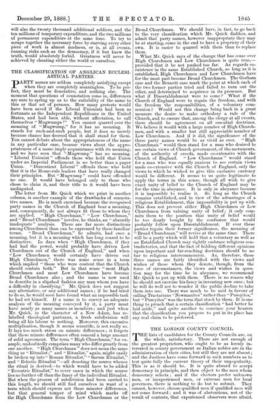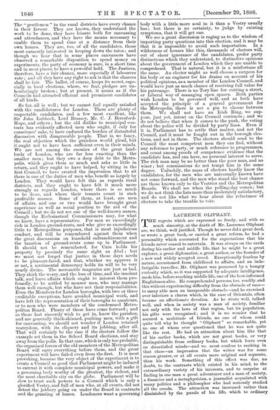THE LONDON COUNTY COUNCIL. T HE lists of candidates for the
County Councils are, on the whole, satisfactory. There are not enough of the greatest proprietors, who ought to be as keenly in- terested in county government as Italian nobles are in the administration of their cities, but still they are not absent ; and the Justices have come forward in such numbers as to test quite fully the current theory of their unpopularity. This is as it should be. It is quite absurd to accept democracy in principle, and then object to the men whom democracy selects ; and if the electors prefer unknown men, or inexperienced men, or extreme men for local governors, there is nothing to do but to submit. They cannot, however, choose qualified men if qualified men will not come forward ; and it was of abstentions, not of the result of contests, that experienced observers were afraid. The " gentlemen " in the rural districts have every chance in their favour. They are known, they understand the work to be done, they have leisure both for canvassing and attendances, and they have the means necessary to enable them to spend time at a distance from their own homes. They are, too, of all the candidates, those most earnestly interested in keeping down the rates ; and though we hear that in some places canvassers have observed a remarkable disposition to spend money on experiments, the party of economy is sure, in a short time and in most places, to have a powerful hold. The Justices, therefore, have a fair chance, more especially if labourers vote ; and all they have any right to ask is that the chances shall be fair. The ballot, of course, keeps its secret, espe- cially in local elections, where, we fear, pledges are un- hesitatingly broken ; but at present, it seems as if the Councils had attracted efficient and prominent candidates of all kinds.
So far, all is well ; but we cannot feel equally satisfied with the candidatures for London. There are plenty of respectable candidates, and a few most excellent, like Sir John Lubbock, Lord Brassey, Mr. C. J. Beresford- Hope, and others ; but the old dislike to municipal con- tests has evidently affected men who ought, if only for conscience' sake, to have endured the burden of distasteful discussion with disagreeable people. That is, we fancy, the real objection which the grandees would plead, but it ought not to have been sufficient even in their minds. We are not among the enemies of the great land- lords of London, who are far less exacting than the smaller men ; but they owe a deep debt to the Metro- polis, which gives them so much and asks so little in return, and they ought to have helped, by sitting in the first Council, to have created the impression that to sit there is one of the duties of men who benefit so largely by London. They would have felt this as regards rural districts, and. they ought to have felt it much more strongly as regards London, where there is so much to be done, and where their tenants count in such profitable masses. Some of them, at least, are men of affairs, and one or two would have brought great experience as well as social position to the aid of the Council ; but we do not see one of the well-known names, though the Ecclesiastical Commissioners may, for what we know, have a representative. For men so exceedingly rich in London ground-rents, and who give so exceedingly little to Metropolitan purposes, that is most injudicious conduct, and will be remembered against them when the great discussions on leasehold enfranchisement and the taxation of ground-rents come up in Parliament. It should not be remembered, for Cain holds his property by precisely the same right as Abel ; but we must not forget that justice in these days needs to be pleasant-faced, and that, whether we approve it or not, a sentimental democracy holds its will to be very nearly divine. The mercantile magnates are just as bad. They shirk the worry, and the loss of time, and the insolent talk, and leave affairs which ought to interest them pro- foundly, to be settled by meaner men, who may manage them well enough, but who have not their responsibilities. Even the Members for London boroughs, with two or three creditable exceptions, have avoided municipal work, and have left the representation of their boroughs to amateurs, or to men who were members of the condemned Metro- politan Board. Plenty of these have come forward ; and as these last sincerely wish to get in, know the parishes, and are generally thick-skinned, pushing men, with a gift for canvassing, we should not wonder if London retained vestrydom, with its cliquery and its jobbing, after all. That will certainly be the case if the electors follow the example set them in the School Board elections, and stay away from the polls. In that case, which is only too probable, the organised forces of the old members of the Metropolitan Board will carry everything before them, and. the great experiment will have failed even from the first. It is most provoking, because the very object of the experiment is to create a Council so good. that Parliament might be induced to entrust it with complete municipal powers, and make it a governing body worthy of the greatest, the richest, and the most charitable city on the globe. Parliament will be slow to trust such powers to a. Council which is only a glorified Vestry, and full of men who, at all events, did not detect the jobbery going on under the Board in contracts and the granting of leases. Londoners want a governing body with a little more soul in it than a Vestry usually has ; but there is no certainty, to judge by existing symptoms, that it will get one. We see a great discussion is raging as to the wisdom of importing party questions into this election, and it may be that it is impossible to avoid such importation. In a wilderness of houses like this, thousands of electors will, out of sheer ignorance of the candidates, prefer party distinctions which they understand, to distinctive opinions about the government of London which they are unable to comprehend. That is natural, but it is a misfortune all the same. An elector might as well choose a surgeon for his body or an engineer for his drains on account of his political opinions, as a member of the London Council, and would have just as much chance of receiving full value for his patronage. There is no Tory line for cutting a street, or Liberal way of managing open spaces. Both parties wish London to be governed well, and as both have accepted the principle of a general government for the Metropolis, there is not a pin to choose between them. We shall not have an Irish Ring, we sup- pose, just yet, intent on the Council contracts ; and we do not believe that when it comes to the push, the voting about the police will be divided by party lines. Even if it is, Parliament has to settle that matter, and not the Council, and it must be fought out in the borough elec- tions, and not in these. The electors should send to the Council the most competent men they can find, without any reference to party, or much reference to programmes, and count among proofs of competence evidence that the candidate has, and can have, no personal interest to serve. The rich man may be no better than the poor man, and no wiser ; but commissions do not tempt him in the same degree. Unluckily, the mass of electors hardly know the candidates, for the men who are universally known have not come forward, and the men who stand the best chance are those known only to the Vestries and the Metropolitan Boards. We shall see when the polling-day comes ; but we do not think the lists more than moderately satisfactory, and do not like what we hear about the reluctance of electors to take the trouble to vote.



































 Previous page
Previous page